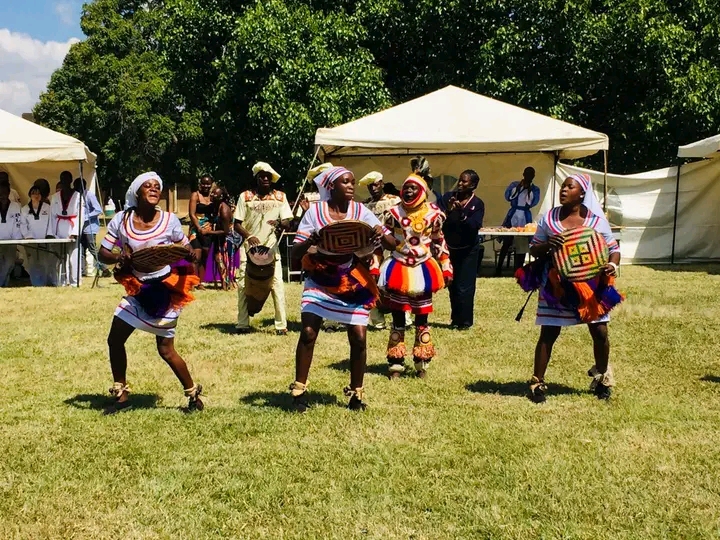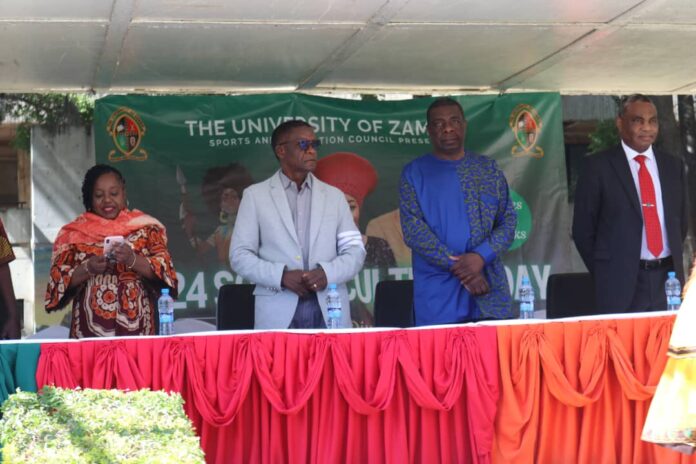It is morning of the 10th of May,2024.The air is palpably charged with anticipation at the University of Zambia (UNZA) main campus.
A cultural dance group clad in costumes approach the students hostels and twirl for about five to ten minutes.At the end of the short dance one of them loudly says, “Viva Ba Monk Viva Ba Momma,We are inviting you to the Social Cultural Day at Graduation square.”
Before mid-morning students flock the arena dressed in traditional attire and some in high school uniforms.
The arena is a spacious square shaped ground.On one side dozens of chairs have been set for the students and attendees.
The stage for performances and entertainment is set diagonically to the podium were officials have sat.
Behind their well-cushioned chairs is a banner with words written visibly: UNZA Social Cultural Day; Unity in diversity.
As more students enter the arena, the alacrity becomes intense as if the earth beneath their feet buzzed with excitement of the coming convergence of cultures.
By mid-morning the arena is overflowingly occupied.The sight is mesmerizing with a diversity of traditional attire forming ambience.
The atmosphere is a vibrant mosaic, every turn offered a visual and sensory feast.
Imagine a painter’s palette so laden with colours that it dazzles the eye, and yet no single hue overpowers another.
UNZA’s staff members marvelled in traditional attire were wallowing in the feat of wide smiles.
The Vice-Chancellor, Mundia Muya rise to the podium to officially open the ceremony.In the opening remarks he reiterates the need for cultural diversity and inclusivity at the institution.
He says cultural day is an important day that embodies a spirit of unity in diversity.

“UNZA is a community with people from different parts of the world and the theme is focused on creating a society where everyone feels valued, respected and included,” he says.
Entertainment activities lined up for the day begin to make dots on the stage taking the spectators into the deepest rhythm.
The participants, dressed in their traditional attires, seem not just attendees but ambassadors of their homelands, eager to exchange knowledge, share stories, and build bridges of mutual respect.
As poets take turns in describing their hearts intercourse through words of passionate poetry leaving the mass in awe.
The event is interspersed with performances from Moses Sakala of Sakala brother’s music to the energetic leaps and twirls of the Tonga ‘balangombe’ folk dancers.

Each performance demonstrates an act of sharing, an invitation to understand and appreciate the richness of world cultures.
The strumming of a traditional guitar overlaid with the soft murmurs of poetry creates a melody that seemed to transcend cultural barriers and leave a lasting impression to a spectator.
As the event unveils more activities,the audience witness Legendary singer Angela Nyirenda taking over the stage dressed like a Ngoni warrior ready to take on the crowd with spears of traditional music.
“Tainvwila lishombe!, lishombe!, oh lishombe! tebana bachingoni! Ampenzeni! Oh, muntaunga tawela, kuno kumuntengula!,” she sings as the audience shouts along.
Students sat cheerily admiring the somber elegance of a Ngoni traditional attire.
The rhythmic drumbeats of the dancers seem to resonate with the vitality of the earth, inviting even the most reserved spectators to twirl.
As martial artists captivated an eager crowd with a disciplined martial arts display, their performance narrates the Japanese culture of respect and humility.
Dressed in traditional white gi with black belts, they execute a series of precise katas, their movements blending power and grace.
Each forceful kick and punch was accompanied by spirited shouts (kiai), demonstrating intense focus and control.
“By observing this day, students that do not belong to certain practices and beliefs of a particular area get to display their beliefs and traditions without any fear of discrimination or being judged,as a result this boosts their confidence,” says Lindrose Mativenga a second-year student originally from Zimbabwe.
Ms. Mativenga encourages people to take keen interest in knowing about other people’s cultures to have a wider perspective about life.
“This entails that by participating and engaging in the social and cultural day, you are putting yourself at a stand point where you get to understand people minus basing your understanding or knowledge from other people who might want to produce biased information about a certain culture,” she says amid the bustling cultural activities.
This article was co-written by Caren Nambela

